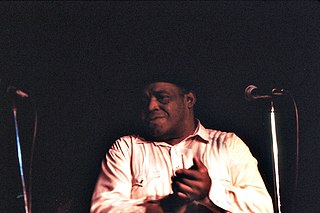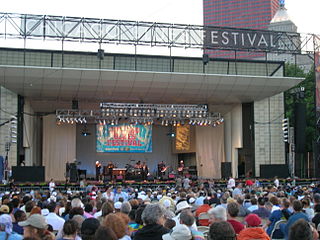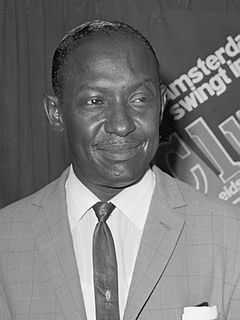Related Research Articles

William James Dixon was an American blues musician, vocalist, songwriter, arranger and record producer. He was proficient in playing both the upright bass and the guitar, and sang with a distinctive voice, but he is perhaps best known as one of the most prolific songwriters of his time. Next to Muddy Waters, Dixon is recognized as the most influential person in shaping the post–World War II sound of the Chicago blues.

McKinley Morganfield, known professionally as Muddy Waters, was an American blues singer-songwriter and musician who was an important figure in the post-war blues scene, and is often cited as the "father of modern Chicago blues". His style of playing has been described as "raining down Delta beatitude".
Electric blues refers to any type of blues music distinguished by the use of electric amplification for musical instruments. The guitar was the first instrument to be popularly amplified and used by early pioneers T-Bone Walker in the late 1930s and John Lee Hooker and Muddy Waters in the 1940s. Their styles developed into West Coast blues, Detroit blues, and post-World War II Chicago blues, which differed from earlier, predominantly acoustic-style blues. By the early 1950s, Little Walter was a featured soloist on blues harmonica using a small hand-held microphone fed into a guitar amplifier. Although it took a little longer, the electric bass guitar gradually replaced the stand-up bass by the early 1960s. Electric organs and especially keyboards later became widely used in electric blues.

The Chicago Blues Festival is an annual event held in June, that features three days of performances by top-tier blues musicians, both old favorites and the up-and-coming. It is hosted by the City of Chicago Department of Cultural Affairs and Special Events, and always occurs in early June. Until 2017, the event always took place at and around Petrillo Music Shell in Grant Park, adjacent to the Lake Michigan waterfront east of the Loop in Chicago. In 2017, the festival was moved to the nearby Millennium Park.

Joe Willie "Pinetop" Perkins was an American blues pianist. He played with some of the most influential blues and rock-and-roll performers of his time and received numerous honors, including a Grammy Lifetime Achievement Award and induction into the Blues Hall of Fame.

Earl Zebedee Hooker was a Chicago blues guitarist known for his slide guitar playing. Considered a "musician's musician", he performed with blues artists such as Sonny Boy Williamson II, Junior Wells, and John Lee Hooker and fronted his own bands. An early player of the electric guitar, Hooker was influenced by the modern urban styles of T-Bone Walker and Robert Nighthawk. He recorded several singles and albums as a bandleader and with other well-known artists. His "Blue Guitar", a slide guitar instrumental single, was popular in the Chicago area and was later overdubbed with vocals by Muddy Waters as "You Shook Me".

Jack N. Johnson, known as Big Jack Johnson was an American electric blues musician, one of the "present-day exponents of an edgier, electrified version of the raw, uncut Delta blues sound." He was one of a small number of blues musicians who played the mandolin. He won a W. C. Handy Award in 2003 for best acoustic blues album.
Floyd Dixon was an American rhythm-and-blues pianist and singer.

Edward Riley Boyd was an American blues pianist, singer and songwriter, best known for his recordings in the early 1950s, including the number one R&B chart hit "Five Long Years".

Black Magic is a studio album by Chicago blues musician Magic Sam. Delmark Records released it under the name of "Magic Sam Blues Band" in November 1969, shortly before his death. The album was a follow-up to Magic Sam's highly influential studio debut, West Side Soul (1968), and also includes a mix of originals with songs written by his contemporaries.
"Wang Dang Doodle" is a blues song written by Willie Dixon. Music critic Mike Rowe calls it a party song in an urban style with its massive, rolling, exciting beat. It was first recorded by Howlin' Wolf in 1960 and released by Chess Records in 1961. In 1965, Dixon and Leonard Chess persuaded Koko Taylor to record it for Checker Records, a Chess subsidiary. Taylor's rendition quickly became a hit, reaching number thirteen on the Billboard R&B chart and number 58 on the pop chart. "Wang Dang Doodle" became a blues standard and has been recorded by various artists.

Billy Branch is an American blues harmonica player and singer of Chicago blues. Branch is a three-time Grammy nominee, a retired two-term governor of the Chicago Grammy Chapter, an Emmy Award winner, and a winner of the Addy Award. In addition, he has received numerous humanitarian and music awards.

Debuting in 1973, the San Francisco Blues Festival was one of the longest running blues festival in the United States. Tom Mazzolini, the event's producer, founded the blues festival to educate the public about the history and evolution of the blues. Many of the performers at the early concerts were the pioneers and originators of the West Coast blues sound.

Willie Lee "Big Eyes" Smith was an American electric blues vocalist, harmonica player, and drummer. He was best known for several stints with the Muddy Waters band beginning in the early 1960s.

Arley "Buster" Benton was an American blues guitarist and singer. He played guitar in Willie Dixon's Blues All-Stars and is best known for his solo rendition of Dixon's song "Spider in My Stew." Benton was tenacious, and despite the amputation of parts of both legs in the latter part of his lengthy career, he never stopped playing his own version of Chicago blues.

Ken Saydak is an American Chicago blues pianist and singer-songwriter. In a long career, he has played as a sideman with Lonnie Brooks, Mighty Joe Young, Johnny Winter and Dave Specter. Saydak has released three albums under his own name since 1999. Billboard once described him as "a gripping frontman".
Johnny Drummer is an American Chicago blues and soul blues singer, keyboardist, drummer, harmonica player, and songwriter. His stage name came after he saw the film Johnny Guitar, at a time when his chosen instrument was the drums.
Warren George Harding Lee, known professionally as Lee Jackson, was an American Chicago blues guitarist, bass guitarist, singer and songwriter. Although he did release a number of recordings in his own name, such as Lonely Girl (1974), he is most known for his work on recordings with other blues musicians such as Johnny Shines, Willie Dixon, Jimmy Reed, J. B. Hutto, Sunnyland Slim, Lacy Gibson, and Little Walter. AllMusic noted that "the playing style of Jackson is vastly influential".
References
- 1 2 3 4 Bill Dahl (1950-01-24). "Johnny B. Moore | Biography". AllMusic. Retrieved 2014-01-26.
- 1 2 3 4 5 6 7 8 9 Manheim, James M. "Johnny B. Moore 1950-". Encyclopedia.com. Retrieved August 13, 2010.
- ↑ Herzhaft, Gérard (1997). Encyclopedia of the Blues (2nd ed.). Fayetteville: The University of Arkansas Press. p. 56. ISBN 1-55728-452-0.
- 1 2 3 4 5 6 Russell, Tony (1997). The Blues: From Robert Johnson to Robert Cray. Dubai: Carlton Books. p. 148. ISBN 1-85868-255-X.
- ↑ Hanson, Karen (2007). Today's Chicago Blues (1st ed.). Chicago: Lake Claremont Press. p. 56. ISBN 978-1-893121-19-5.
- ↑ Earl Simmons. "Acoustic Blue Chicago – Johnny B. Moore | Songs, Reviews, Credits, Awards". AllMusic. Retrieved 2014-01-26.
- ↑ JazzTimes - Google Books. December 1994. Retrieved 2014-01-26.
- ↑ Matt Collar. "Rockin' in the Same Old Boat – Johnny B. Moore | Songs, Reviews, Credits, Awards". AllMusic. Retrieved 2014-01-26.
- ↑ "Johnny B. Moore | Discography". AllMusic. 1950-01-24. Retrieved 2014-01-26.